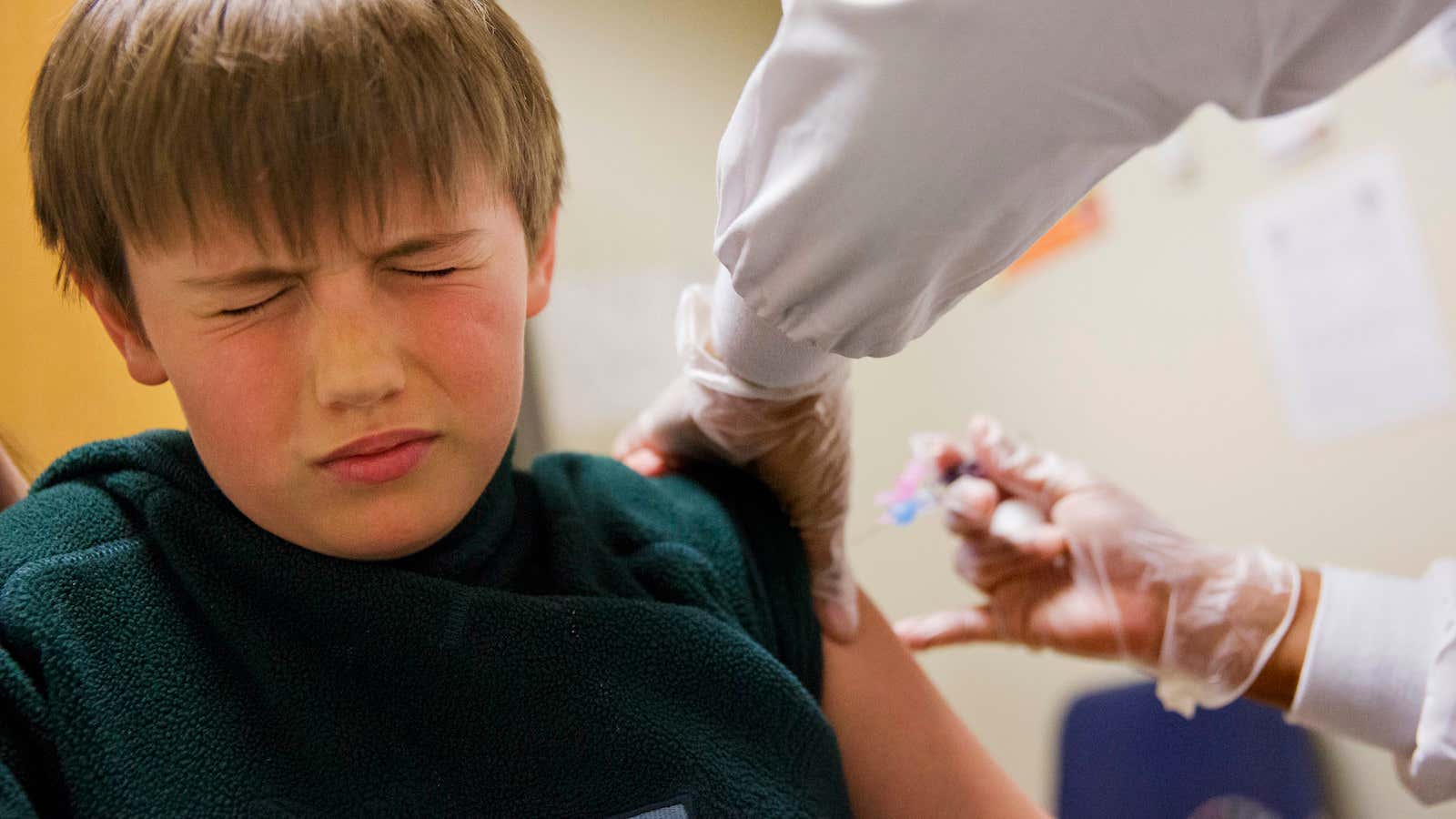Sometimes it takes rebellious youth to help us see the error of our ways.
Consider Ethan Lindenberger, an 18-year-old from Ohio. His act of rebellion wasn’t staying out past curfew or avoiding his homework: It was getting vaccinated on his own, despite his mother’s protests.
Lindenberger’s mother opted her children out of vaccines and fed them messages about the dangers of immunizations. As he posted on Reddit, “My parents think vaccines are some kind of government scheme. It’s stupid and I’ve had countless arguments over the topic.”
So when he turned 18, he asked Reddit how he could get the shots he had been denied throughout his childhood: flu, pneumonia, chickenpox, hepatitis A, hepatitis B, HPV, meningitis, MMR, tetanus booster, and TDAP (whooping cough).
Redditors gave him guidance, and the thread went viral. The whole episode ended with Lindenberger testifying to Congress earlier this month. In New York, his testimony moved two state lawmakers so much that they’re proposing a bill in the state legislature allowing teenagers 14 and up to get vaccinated—even if doing so goes against their parents’ wishes.
Lindenberger’s testimony and this bill couldn’t come at a more important time. A measles outbreak recently hit the state of New York, with almost 200 confirmed cases state-wide. In Brooklyn alone, there have been 133 reported cases of measles since last October. And around the country in just the first three months of 2019, 12 states have reported cases of measles—the fastest infection rate on record.
This was not supposed to happen. In 2000, the Center for Disease Control declared measles eliminated in the United States. So what changed in the two intervening decades?
Simple: a misinformation campaign about vaccines fueled by social media that has led to many more unvaccinated people.
How people become anti-vaxxers
Lindenberger’s mother is a prime case. Her information about vaccines came from “anti-vaxx” groups on Facebook. As her son put it, “She thought vaccines were a conspiracy by the government to kill children.”
She is not alone. On Facebook and elsewhere online, hives of misinformation and pseudoscience push the view that vaccines are dangerous—that they lead to autism, that they are a government plot, or that they cause the diseases they are supposed to prevent.
Researchers and doctors have thoroughly debunked these claims again and again. But in the digital world, myths masquerade as truths. And well-intentioned people like Lindenberger’s mother make unsafe decisions as a result.
How we can stop anti-vaxxers
What can to be done? For one thing, laws can help. In the same way New York state lawmakers took action, we need federal action to allow young people to take their health and safety into their own hands when their parents won’t. We also need to strengthen and support legislation that blocks unvaccinated children from attending school. Specifically, lawmakers need to close “religious exemption” loopholes, or severely limit them with the input of medical and public-health professionals, as they allow parents to put other people’s children at risk.
A federal judge recently supported that view: When parents of unvaccinated children attempted to allow their children to return to a school recently struck by a measles outbreak, the judge blocked their entry. He’s not the only one. In Italy, a new law went into effect this month that barred unvaccinated children under six from school and fined parents of children older than six for not vaccinating their kids.
This is not, as some critics would suggest, government overreach. It is common sense, and these proposed measures resemble the many laws on the books that protect the public interest, even when they proscribe individual conduct. For example, driver’s license requirements, prohibitions on smoking on airplanes, restrictions on falsely yelling fire in a crowded theater—these widely accepted examples put the public interest ahead of private interests. Legislation on vaccines operates in the same spirit.
Laws, however, take time to enact. What we can do right away is take action on sources of misinformation. The public needs to stand up and tell Facebook, Twitter, and other social-media platforms that enough is enough. Facebook has begun to take small steps in this direction: They’re banning anti-vaccine information from being promoted through ads, and lowering its rank in search results. But they could go further. Pinterest, for example, has blocked searches on vaccinations, and Amazon pulled anti-vaxx documentaries from their catalog altogether. Facebook needs to ban anti-vaccine posts outright, and public pressure could get them to do just that.
Finally, we need to hold our leaders and influencers accountable. No matter how many laws we change or how many platforms we fix, a single stray comment from an authority figure can undo years of work. That goes double for politicians—people whom we entrust to make decisions in the public interest. So when someone like US congressman Mark Green questions the value of vaccines, it isn’t enough to move on. Even though he has now flipped his position and insists he vaccinates his kids, it’s too late: He gave his credibility—and by extension, Congressional credibility—to those peddling dangerous hoaxes. This isn’t a purely partisan issue: Both Democrats and Republicans have questioned vaccines in Congress, sometimes going so far as berating the director of the Center for Disease Control. There’s no place for conspiracy theorists and science deniers in leadership, and they should be voted out of office when the next election comes around.
Ethan Lindenberger’s decision to disobey his mother is a clarion call. We are well past the point of debate on vaccines, and our society runs grave risks by allowing the numbers of unvaccinated children to rise and allowing scientific falsehoods to spread. It is time for society-wide action on this issue—changes to our laws, improvements to our sources of information, and firm resistance to those who peddle pseudoscience. Few acts could be more urgent or more important.
